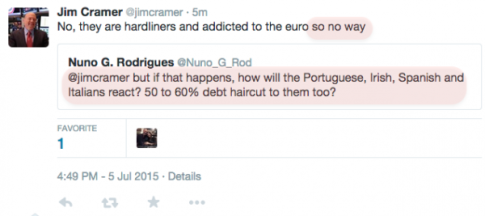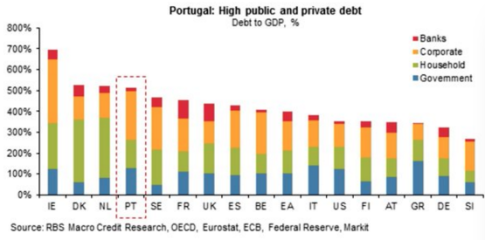– Black Swan Lands In Portugal As Socialists Move To Overthrow Government:
Late last month we highlighted to reappointment of Portuguese PM Pedro Passos Coelho, noting that, in the words of Communist leader Jerónimo de Sousa, the President’s move to ignore the left’s attempt to form a government in the wake of largely inconclusive elections may be a “manifest waste of time.”
As FT put it a few weeks back, “no government on the left or right [can] hope to survive without support from the PS, which won 32.3 per cent [in October]” which means President Anibal Cavaco Silva might have made a mistake in propping up Coelho as the PM’s restoration will only serve to embolden an already angry left coalition.
Well sure enough, socialist leader Antonio Costa has now “formalized” plans to unite with the Left Bloc and Communists in order to reject the Coelho government. Here’s Bloomberg:
Portugal’s Socialists approved a plan to join forces with three other parties and oust Prime Minister Pedro Passos Coelho’s administration, raising the prospect of a new government committed to speeding the reversal of spending cuts tied to the country’s international bailout.
The Socialist-led program “is clearly less market-friendly than the one of the incumbent government,” analysts at the Royal Bank of Scotland Group Plc in London, including Clement Mary-Dauphin, said.
The Coelho government will fall if the Socialists and their allies close ranks and guarantee a majority in parliament to reject the program in a vote scheduled for Tuesday. President Anibal Cavaco Silva, who has the power to name prime ministers, would then decide if he’ll ask Costa to form a coalition. Parliament can’t be dissolved less than six months after it’s elected, meaning Cavaco Silva doesn’t have the option of calling fresh elections.
“The conditions are in place to form a Socialist Party government supported by a majority in parliament,” the party said in a statement e-mailed early on Monday. The Socialist government can be “stable” and last for a full term, it said.
Well, it can probably be “stable” domestically, but don’t think for a second that Brussels and Berlin are going to put up with this.
After all, the whole point of putting Alexis Tsipras through round after round of “mental waterboarding” over the summer was to discourage any Syriza sympathizers from attempting to use a euro exit (i.e. proving that the EMU is in fact “dissoluble” despite the protestations of many a eurocrat) as a bargaining chip on the way to negotiating for debt relief. As we put it, “the real question is whether or not the ATM lines, empty shelves, and gas station queues in Greece have had their intended psychological effect on Spanish (and Portuguese) voters. In other words, the question is whether the troika has succeeded in undercutting the democratic process outside of Greece by indirectly strong-arming the electorate.”
The answer, apparently, is “no” because as Bloomberg goes on to point out, the new coalition in Portugal will likely push to roll back the programs that have made the country a bailout “success” story:
Yields [on Portuguese bonds] rose 6 basis points to 2.74 percent as of 8:53 a.m. London time, after reaching 2.78 percent, the highest since July. While the security traded as high as 18 percent three years ago at the height of Europe’s debt crisis, it was as low as 1.5 percent in March and 2.3 percent just before the elections.
The Left Bloc has said in the past that it wants to restructure the country’s debt, and the Communists have said Portugal should prepare to exit the euro. The Socialist, who requested the bailout and then lost the 2011 election, have been less radical, voting alongside Coelho’s coalition on policies including the treaty establishing the European Stability Mechanism rescue fund.
So while Costa will probably take a more moderate approach than his new coalition partners, the socialists are aligning with anti-euro parties which means that in failry short order, you’ll likely see friction develop between Lisbon and Brussels and critically, between Lisbon and Berlin. Here’s AFP:
The prospect of a new government backed by the Left Bloc — which is close to Greece’s anti-austerity Syriza — and the radical Communists raised concern in Europe, even though the Socialist Party (PS) has insisted that “Portugal will respect its international commitments” whoever takes the reins.
Note that this is the worst nightmare for Jean Claude-Juncker, Angela Merkel, and Christine Lagarde. Just about the last thing the EMU needs is to face a Greek rerun with a country that actually “matters” just as the bloc is desperately attempting to cope with the worsening refugee crisis. But then again, you shouldn’t worry because just like Bear Stearns wasn’t going under, Portugal will never ask for debt relief…
…and it’s a good thing, because all-in, Portugal has one of the highest debt burdens around…
* * *
Bonus color from Citi:
Jose Mourinho may share more than just a common nationality with Portuguese Prime Minister Passos Coelho; both appear to be on the brink of losing their jobs. Portugal may be about to see the first power-grab of its kind in Europe since Turkey’s ‘real postmodern’ coup of 1997 (link here, for those interested).
UKIP MEP Nigel Farage has compared the situation in Portugal to a “modern day implementation of the Brezhnev Doctrine”. Whilst that latest comparison may be a little dramatic, the ramifications and wider consequences of the situation unravelling in Portugal could be huge. We highlighted back at the start of the summer that Portugal could well be Europe’s ‘next Greece’ and fears are perhaps about to be realised…
Background:
Portuguese elections were held on October 4, delivering a centre-right government under PM Coelho – the Forward Portugal Alliance (PAF). This group has already been in power for four years, and had imposed a tough regime of austerity including cuts to pay, pensions and public spending, with tax hikes – all as part of a EUR78bn bailout agreement with the Troika. The country only just emerged from recession in 2014.
Coelho’s group won the most votes and has the largest bloc of seats in parliament; however, it lost its overall majority.
Now the Socialist Party and a number of allies (Communists, Green Party and Left Bloc) control 122 seats in the 230 seats parliament. Their leader, Antonio Costa, has pointed out that 62% of the population, in his eyes, ‘voted against’ the austerity politics of the incumbent government. This new leftist alliance is anti-austerity and fiercely Eurosceptic – several of the parties campaigned directly to withdraw from the EUR.
Despite their apparent majority, the President spurned the anti-European leftists and named the centre-right group under PM Coelho as a minority government. He was supposedly under pressure to do so from Germany’s Chancellor Merkel who described the prospect of a radical anti-austerity coalition in Portugal as “very negative”. The left-wing alliance has now vowed to oust the government and put an end to austerity.
Potential ramifications:
As you would expect, the first consequence for these alarming developments was for Portugal’s bond yields to surge this morning. It can do a weak EUR no favours either in the long run.
European totalitarianism? More poignantly though, this is being touted by Eurosceptics as a prime example of what is often referred to as ‘Brussel’s totalitarianism’. In their eyes, what would be a democratically elected majority (the left coalition) with a clear mandate to challenge the Troika’s austerity programme and perhaps even leave the single currency, has been quashed. They argue that Portugal’s sovereignty has been trampled upon in the name of the greater good of the union – if democratic elections are only legitimate if the result pleases Brussels, is there real democracy in Europe?
* * *
Coming soon to Lisbon:




I wonder who’s next…
http://www.mail.com/int/news/europe/3947834-portugals-government-ousted-amid-austerity-backlash.html#.1272-stage-hero1-7